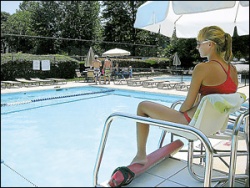04/04/2013
Another source of unacceptable whiteness has been found — this time in lifeguards, who lounge around in their skimpy outfits showing lots of white skin, poised to rescue drowning persons from death.

Phoenix decided that the shocking state of affairs must end, and therefore sent recruiters to non-white high schools to find young people willing to take the plunge.
Swimming skills were not required! Training would be supplied, so details like applicants having a fear of water were deemed unimportant. No mention is given of how rigorous the lifeguard “test” would be.
Diversity-beguiled NPR reported affirmative action swum amok without missing a stroke.
In Phoenix, A New Quest For Diverse Public Pool Lifeguards, NPR, March 28, 2013
After noticing that most of the lifeguards at the public pools used by Latino and African-American kids were white, the Phoenix aquatics department decided to try to recruit minorities.
More than 90 percent of the students at Alhambra High are black, Latino or Asian. On a recruiting effort there over the winter, the city’s Melissa Boyle tells students she’s not looking for strong swimmers. Like many under-resourced schools, Alhambra doesn’t have a swim team.
“We will work with you in your swimming abilities,” Boyle says.
Boyle’s colleague Kelly Martinez takes on the delicate task of explaining the scenario the city is trying to correct.
“The kids in the pool are all either Hispanic or black or whatever, and every lifeguard is white,” she says, “and we don’t like that. The kids don’t relate; there’s language issues.”??Martinez turns to a Latina student next to her. “Do you speak Spanish?” she asks. “We need more lifeguards who can speak Spanish.”
Competitive swimming still has a reputation as a white sport. And a national study released in 2010 found African-Americans and Latinos reported much lower swimming proficiency compared to whites.
“It’s that catch-22,” says Becky Hulett, who oversees Phoenix’s public pools. “If the kids don’t learn how to swim, as adults they are not going to swim, [and] they aren’t going to take their own kids to swim.”
So two years ago, Hulett began rethinking lifeguard recruitment. Traditionally, Phoenix’s 500 lifeguards came from more affluent parts of town, most of which are farther from the public pools.
“It really populated from schools that had swim teams, and so that was our feeder into our lifeguarding programs,” she says.
To help diversify its lifeguard ranks, the city raised about $15,000 over the past two years in scholarships to offset the cost of lifeguard-certification courses. Recruits who pass a swim test at the end can apply to be city lifeguards.
As the teens swim laps at Alhambra, it’s clear many haven’t had much formal training. But the coaches of the course aren’t fazed and are prepared to put in the time to teach.??”Honestly, I have a little bit a fear of the water, and I wanted to overcome that fear,” says high school junior Jesus Jimenez. He didn’t grow up going to pools with his family but likes the idea of lifeguarding. ??”It is nice to have the satisfaction of knowing that if somebody is in trouble you can save them at any time,” he says.
If he is selected to be a lifeguard, other pool staff will work with him on his swimming skills all summer.
This report story was done in collaboration with Fronteras, a public radio project that focuses on border and changing demographics in the American Southwest.
This is a content archive of VDARE.com, which Letitia James forced off of the Internet using lawfare.